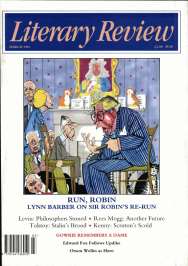Lizzie Francke
Carry On Up the Weimar
Divine Decadence: Fascism, Female Spectacle, and the Makings of Sally Bowles
By Linda Mizejewski
Princeton University Press 272pp £25
At the beginning of this year The Times ran a fashion spread contemplating the revival of a 1970s-style maquillage. Amongst the close-ups of the pale moon faces with their tendrilled hair, rind-thin plucked eyebrows and sugary plum lips was a poster for the film Cabaret. With her shiny black helmet of a haircut, bead choker and spider-leg eyelashes, Liza Minnelli's Sally Bowles instantly becomes a marker for a garish retro-fashion. 'Divinely decadent, darling,' as this American chanteuse on the make in Berlin during the Weimar years famously said, twinking her green-varnished fingers in the air. Indeed, complete with the black boots, stockings and suspenders, the bowler hat perched coquettishly on the side of her head, she is presented as an icon of decadence that is at once camp (we are talking Judy Garland's daughter here) and pornographically suggestive. It echoes a range of other images, from Marlene Dietrich gartered and stockinged in a real Weimar movie, The Blue Angel, to the S & M manuals with their Nazi regalia. As part of a 1970s take on the worm-ridden years that saw the rise of Hitler, it seems strangely propitious that this manifestation of Sally Bowles should be put under the fashion spotlight now. But then, from her inception in Christopher Isherwood's book of autobiographical sketches Goodbye to Berlin, Sally has, as Linda Mizejewski rigorously argues, a habit of popping up at moments of crisis, her tale retold to reflect the anxieties of the age.
Few short-story characters have enjoyed such longevity, but Sally has come a long way since the Isherwood text, which was so, considering the opening lines of Isherwood's original text: published just before the outbreak of World War Two. There she was a mere slip of a girl, who could just

Sign Up to our newsletter
Receive free articles, highlights from the archive, news, details of prizes, and much more.@Lit_Review
Follow Literary Review on Twitter
Twitter Feed
‘The Second World War was won in Oxford. Discuss.’
@RankinNick gives the question his best shot.
Nicholas Rankin - We Shall Fight in the Buttery
Nicholas Rankin: We Shall Fight in the Buttery - Oxford’s War 1939–1945 by Ashley Jackson
literaryreview.co.uk
For the first time, all of Sylvia Plath’s surviving prose, a massive body of stories, articles, reviews and letters, has been gathered together in a single volume.
@FionaRSampson sifts it for evidence of how the young Sylvia became Sylvia Plath.
Fiona Sampson - Changed in a Minute
Fiona Sampson: Changed in a Minute - The Collected Prose of Sylvia Plath by Peter K Steinberg (ed)
literaryreview.co.uk
The ruling class has lost its sprezzatura.
On porky rolodexes and the persistence of elite reproduction, for the @Lit_Review: